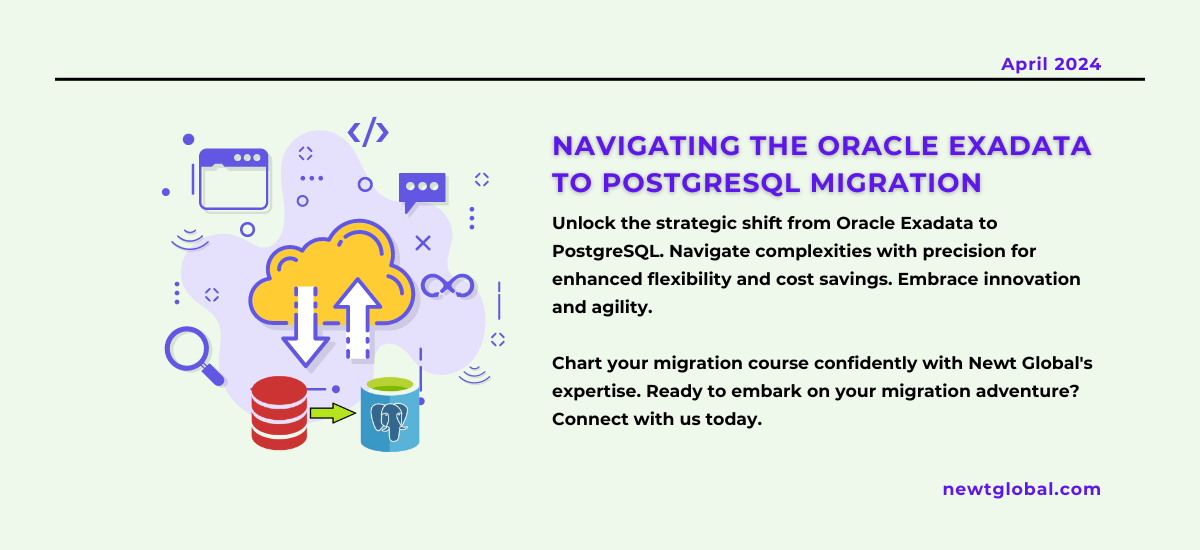
Moving from Oracle Exadata to PostgreSQL is more than just changing the type of database. It’s a big shift in how an organization manages its data. Oracle Exadata is known for being really fast, scalable, and packed with features for big operations. It sets a high standard. On the other hand, PostgreSQL is appealing because it’s open-source, meaning it’s flexible and comes with a lot of features. This change can save money and make it easier to adapt, but it’s not simple. It needs careful planning and strategy.
Understanding the Differences in Design
-
- Performance and Scalability: Oracle Exadata is built for super-fast computing, with special hardware and software to make it fast. PostgreSQL is also fast but depends more on the hardware and network setup for speed. To switch, we have to plan well and test to make sure PostgreSQL can perform as well as or better than Oracle Exadata.
Complexity of Data Migration
-
- Matching Schemas and Data Types: Moving data from Oracle to PostgreSQL means we have to match up the types of data and how they’re organized, which can be hard because Oracle and PostgreSQL handle data types differently.
- Moving Stored Procedures and Triggers: Oracle and PostgreSQL use different ways to write code that runs in the database. Switching means we have to translate and adjust these codes, which takes time and can have mistakes.
Changes in How We Manage and Maintain
-
- Backups and Recovery: Oracle Exadata has ways to back up data that PostgreSQL doesn’t have exactly. We need new plans for backing up data, recovering from disasters, and keeping data safe in PostgreSQL.
- Improving Performance: Making PostgreSQL run as fast as Oracle Exadata needs a different strategy. We have to learn how to use PostgreSQL’s tools to make it faster, which can be hard at first.
Thinking About Costs and Support
-
- Costs: PostgreSQL can be cheaper than Oracle, but we need to think about all the costs, like support, training, and maybe buying more equipment or software to make PostgreSQL work as well as we need it to.
- Community vs. Enterprise Support: Oracle has a big team that helps if things go wrong. PostgreSQL has a big community of users who share information and help each other, but some organizations might want more official support like what Oracle provides.
Embracing the Change Strategically
Switching from Oracle Exadata to PostgreSQL is a big move toward a more flexible and cost-effective way to manage data. It’s hard, but with careful planning, testing, and using the right tools and services, it can be done. This change opens up new chances for innovation, flexibility, and saving money. It’s a journey, but by facing the challenges and following a good plan, you can make the switch successfully and take full advantage of PostgreSQL’s power as an open-source database. So, get ready, plan well, and take on this adventure with confidence!
Ready to embark on the transformative journey from Oracle Exadata to PostgreSQL?
Navigate the migration maze with confidence and transition to a more flexible and cost-effective data management solution. Embrace the change, unlock new opportunities for innovation and agility, and set sail on your migration adventure today!
For expert guidance and comprehensive support tailored to your unique migration needs, visit Newt Global at newtglobal.com. Reach out to us at marketing@newtglobalcorp.com for a personalized consultation or to tackle specific challenges. With Newt Global’s expertise, you can confidently chart a successful course from Oracle Exadata to PostgreSQL, ensuring a smooth and efficient migration journey.
Newt Global DMAP is a world-class product enabling mass migration of Oracle Db to cloud-native PostgreSQL faster, better, and cheaper. Don’t wait, take action now and revolutionize your data management approach!
